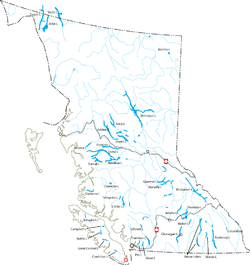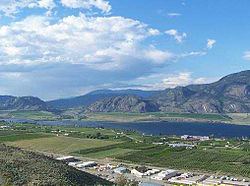Larger lake statistics
| Lake | Area (including islands) | Altitude | Max. depth | Volume |
|---|---|---|---|---|
| Williston Lake [1] | 1,761 km2 (680 sq mi) | 671 m (2,201 ft) | ||
| Nechako Reservoir | 890 km2 (340 sq mi) | 853 m (2,799 ft) | 305 m (1,001 ft) | |
| Atlin Lake [1] | 775 km2 (299 sq mi) | 668 m (2,192 ft) | ||
| Babine Lake [1] | 495 km2 (191 sq mi) | 711 m (2,333 ft) | ||
| Kootenay Lake [1] | 407 km2 (157 sq mi) | 532 m (1,745 ft) |









